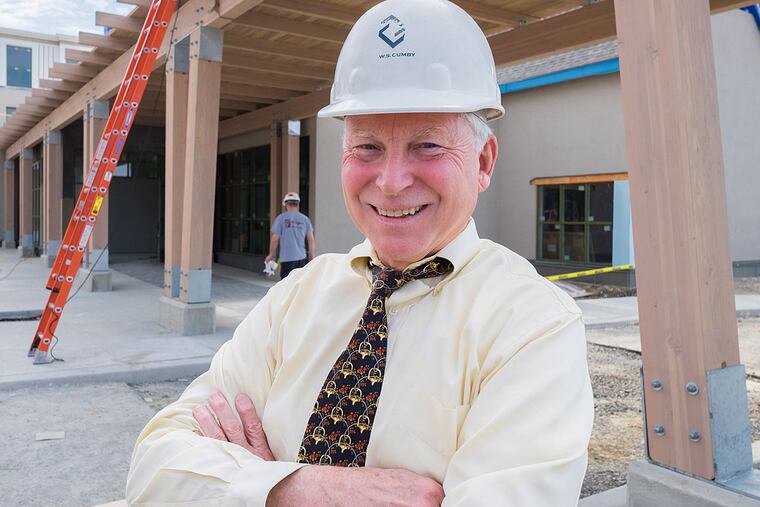Bill Cumby Jr. talks about building good relationships
Why the contracting firm went from a union to a merit shop.

When Bill Cumby Jr. and his father, Bill Sr., started W.S. Cumby Inc. in 1981, they began it as a union general contracting and project management company.
"In 1981, if you wanted to do our kind of work - good-quality commercial work - you were a union contractor," said Cumby Jr., 66, who took over as president in 1998.
By the late 1980s and early 1990s, father and son switched to a merit shop (non-union) business, repudiating their contracts with the unions for carpenters and laborers.
These days, W.S. Cumby works mostly in the suburbs, its portfolio heavy with polished libraries, dormitories, and student centers at upscale educational institutions such as Princeton, Swarthmore and Haverford.
"There have been major strides in the merit-shop world in terms of education, in terms of quality of the subs [subcontractors], both the businesses and the trade people. So, it's a very different world," Cumby Jr. said.
"The work ethic was getting to a point where we felt the future was going to be in merit-shop construction."
Ever run into troubles with the unions when working in the city?
We haven't done a lot of work in the city on a merit-shop basis, so we haven't had a lot of problems. We did a $2.5 million to $3 million project at 20th and Washington a few years ago. Our electricians had the tires on their trucks slashed in spite of the fact that the trucks were not marked and that they parked them in different locations, hoping to avoid a problem. Needless to say, it was impossible to determine who had cut the tires. It was easier to encourage subcontractors to work in the city when business was so slow several years ago, but now that there is a lot of work around, they are less interested in doing so.
There's been talk about labor shortages. What are you seeing?
There are times when there are shortages, meaning, "Hey, we have 10 drywall people, but we'd like to have 15," or "We have six electricians, we really would like to have 10." People are working 10-hour days instead of eight.
Is demand raising wages?
For a while they were pretty stable because there was no demand. I would bet wages have gone up at least 5 percent in the last year.
How do you handle the shortages?
Because we're doing all the planning, we make sure we're dealing with subcontractors who are going to allocate the [labor] resources, that they'll only take on so much work.
In your business, it's all about your relationship with subcontractors, right?
It really is important. We have a level of expectations of performance, and quality, and cooperation with our clients. In exchange, we treat them fairly, we pay them promptly.
Prompt payment seems to be key, especially because they have to pay their people before you pay them.
Sometimes they get stretched. We're not a bank, don't get me wrong, but we'll help them out making their payroll. We try and make sure that the job is ready for them so when they get there, they can get in, do their work, make money and go on.
Most of your projects are private-sector. Ever do any public work?
Our people are really focused on client service and that's not always the mentality that's brought to the public - open bid, low bid - sector. We tried in the downturn. We bid a public job. We were aggressive as we could be [in pricing competitively], and we weren't even close.
Did you ever talk to the architect about it?
I said, "I have no idea how these guys do it." He said, "I'll tell you how they do it." He's poking me in the chest. "They make my life miserable. They don't pay attention to the plans."
You were Swarthmore's mayor. Learn any lessons applicable to business?
As mayor, I found that I had to be much more patient and listen. It made me understand that there are a variety of viewpoints that often you wouldn't have thought of, but that actually have value once you start to reflect on them.
Answers have been edited for space.
215-854-2769@JaneVonBergen